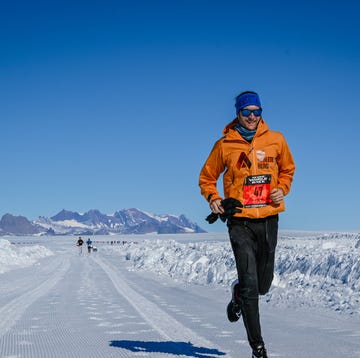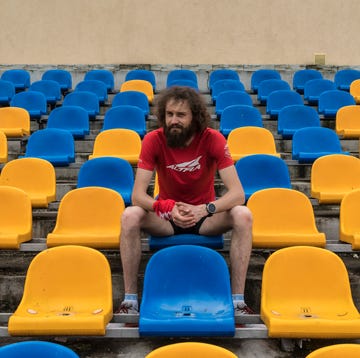They lurk in races like parasites riding a host. Some are benign in intent, accompanying a friend through the last miles of a long race; some are more overtly selfish, meaning to take the credit, Gatorade, and bagels due to legitimate runners without paying for it. A few races, such as the Boston Marathon, grudgingly tolerate them; elsewhere these scofflaws are loathed and despised. They are called "bandits," and on October 9, 2011, I blithely became one.
I woke that morning–my last as a decent human being–with what seemed a nifty notion. In a month I'd be running the Philadelphia Marathon, and this day called for a 20-mile run. It just so happened that not far from my suburban home the Chicago Marathon would soon go off. Why not, CA Notice at Collection, jump on the course, run 20 miles with crowds and company, and step off right before the finish? What follows is how I came to understand the many, varied answers to that question.
Admittedly, I didn't come to banditing blindly. Every runner I know, it seems, has bandited a race once or twice, for a mile or eight. In fact, my plan was inspired by a friend who had done exactly the same thing at the 2010 Chicago Marathon to no apparent ill effect to himself or the 45,000 registered runners including, that year, your correspondent. In the six years prior to my turn to the dark side, I'd run upward of 50 races, and each time I'd been a registered runner with a bib. And in those races, the few bandits I knew about, and the many I didn't, caused me no concern. As of 10/9/11, I was a banditing virgin, which may be why I considered it to be at worst a running misdemeanor, and just a bit exciting for its naughtiness.
My plan went off without a hitch. I took the train to La Salle Street and North Avenue, near the five-mile marker. I waited for the 3:00 pace group to zip by, then jumped in, a bottle of Gatorade in my hand and energy chews in my pocket. My plan to take or leave nothing didn't quite work out: As temperatures edged up into the 70s, I refilled my bottle twice from aid stations, and I did use one portable toilet along the route. Otherwise, I bothered no one, as far as I could tell, and no one bothered me. After mile 25 I slowed to a walk, and headed to the side of the street, where a policewoman raised the barrier tape for me to leave the course. I nodded in thanks. I believe she smiled.
And then, after innocently (or so I thought) banditing one of the world's major marathons, I went home and did something even dumber.
Other Hearst Subscriptions Runner's World Web site, and in the post I wrote later that day I didn't think twice, or even once, about mentioning my 20-miler as an unregistered Chicago Marathon runner. Reading the entry now (see it for yourself at runnersworld.com/bandit), I wince at the feigned breeziness of my guilty conscience. I even smirkingly offered to send Bank of America (the principal marathon sponsor) a check for the Gatorade I drank, if anybody were to complain. I must have known, somehow, that I wouldn't get away with it: The irony, of course, is that I would have if I hadn't blabbed.
It was sometime the next day when I heard that comments were piling up on the blog. And they were not praise for my admirably consistent pace. No, among 62 comments posted, I had been called a thief, a self-absorbed jerk, an idiot, an embarrassment to my employer (NPR, where I am the host of Wait Wait. . .Don't Tell Me!) and to this magazine, and a "minor celebrity." I was scolded, threatened with violence–"Someone should smash him to the ground"–and roundly condemned.
Eventually, the flood of judgment subsided, and I started looking forward to the day when somebody might steal a paraplegic's racing wheelchair and take my place as the most hated man in the sport of running. Then a Wait Wait. . t Tell Me reporter came across the blog, and the story of my immortal, immoral run ran on the newspaper's front page–and the condemnations poured in anew.
Advertisement - Continue Reading Below how wrong? Whom had I harmed, how much had I harmed them, and what, if anything, should I do about it? I decided to seek expert counsel.
The first person I consulted was a rabbi, learned in Talmudic ethics. I laid out the story to Rabbi Douglas Sagal of Westfield, New Jersey, who stroked his beard, cocked an eyebrow, and considered. As he is my brother (and you know how brothers are), he stunned me by saying, "I don't think you did anything wrong."
"There's a principle in the Talmud called Ganeyv-Daat, which means to mislead," he said, sounding quite sage. "But you didn't do that. There was no intent to deceive. It wasn't Rosie Ruiz. You didn't tell people you were planning to enter the marathon, run part of it, and claim you ran the whole thing officially. Your actions didn't cause anybody to suffer a loss. You didn't take anyone's place, so I would argue there's no ethical transgression."
Reassuring! Yet I couldn't take it as definitive. I sought a second opinion, from Christine M. Korsgaard, Ph.D., Harvard professor and a foremost expert on the moral philosophy of Immanuel Kant. Many of my critics made an argument that began "What if everyone did what you did?" and in doing so, were unknowingly (perhaps!) relying on Kant's seminal 1785 Running Shoes - Gear. Kant called this notion "The Categorical Imperative," and Korsgaard proceeded to beat me about the head with it.
"It's applied as a thought experiment," she wrote to me. "Imagine a world in which everyone acts on the same principle that you do, and ask yourself whether, in that world, you could act that way, too." I understood this as a formal statement of the turnstile principle: If you jump a turnstile, the subway will run fine without your $2.25. If everybody jumped the turnstile, the subway would collapse for a lack of funds, and nobody would go anywhere. She also took issue with my argument that I had used little public resources in my run. "Why does the public consent [to let the marathon use the roads]? Maybe the public just approves of marathons, and wants to support them. Or maybe the public gets something in return–the thrill of watching a race, caring who wins, etc. If that's how it goes, the fact that you didn't enter at the starting point or try to finish doesn't excuse you: It makes it worse. You were using just about everybody as a mere means to your ends. So that means you messed up pretty badly. I love your show."
Thanks, Professor.
Finally, I called up the one person who could legitimately sit in judgment on me. If what I had done was a crime, then the person with the best claim to be the victim would be Carey Pinkowski, the race director of the Chicago Marathon.
"You don't have to pay for the Gato-rade," Carey said, magnanimously. But, whether or not he knew it, he was a Kantian: He stressed that the risk to the race organizers was not one person drinking sugar water he didn't pay for, but an unknown number of people on the course, cumulatively taking up space and resources, with no ID, no way to know their medical history, and no way to track them.
Each unregistered runner, Carey said, is an additional strain on resources, and each one on the course puts them closer to not being able to manage the event. "We forecast all our allotted resources, fluids, security, medical personnel, against a certain number of participants."
No race director would ever say it, but a marathon can handle a certain number of bandits–if it couldn't, the whole thing would fall apart the second one stepped onto the pavement. But above that number, the event becomes increasingly unmanageable. Thus, the Chicago Marathon officially has a zero-tolerance policy for bandits, even the friends who jump in to pace a runner in the last mile, let alone the entitled mooks who run a whole 20.
When I asked him what penance I could perform, he offered two choices. I could work at the chip verification station at the expo for Chicago 2012, sitting there for hours, making sure runners had the right packet, so as to understand how rigorous the marathon is about accurately accounting for every participant. Or I could take a shift at a water stop–"The last shift, when everybody's been through it," said Pinkowski, cheerfully–cleaning up thousands of cups, so I could observe, firsthand, how much work and supplies and drudgery goes into looking after the paid, official, honest runners.
I don't yet know which job I'll take, because I don't know yet if I'll be running the race myself, for the sixth time, or seventh if you count my sins against me. But if I do run Chicago 2012, be assured, I'll be wearing an official bib.
I don't think banditing is equivalent to theft; I still don't know who the victim is of a single act like mine. But I have always believed that we are all in this together, we runners, in a fellowship of nylon shorts and chafed skin and cramping calves; that running, unlike any other sport, is a great leveler, as we are all out there on the same course, heading the same way, whatever our speed. My offense wasn't so much against the race organizers or the other runners–neither of whom knew I was there–but against the notion of this fellowship. Even though I thought I was joining all the registered runners on the course that day, what I was in fact doing was separating myself from them, and using them, as Professor Korsgaard said, for my own ends.
You spend a lot of time by yourself, during all those miles, thinking of yourself alone: your pace, your legs, your heart, your fatigue, your strength. That is the nature of our sport. It's easy to think of yourself as being solitary and alone, doing what you must and devil take the hindmost. But at a certain point–when you join a running group or start recognizing people in your circuit of local races or start writing for a running magazine–you realize that you're trying to break out of that shell, and create a community around yourself. And if that's what you want, to run with people, to have people to run with, then you've got to treat them with respect. You wave when you see people out at 6 a.m. on a frozen morning. You never, ever respond to someone else's race result, no matter how slow, with anything but thrilled congratulations. And you don't bandit races. Because if everybody did it, we'd all be back to running on our own, and there wouldn't be an "everybody" to run a race with.
See you at the next Chicago Marathon. I might be at the side of the road, sweeping up cups; I might be on the course, wearing a bib. Either way, next time, I'll be taking part, instead of taking.

Watch Next

Races - Places











